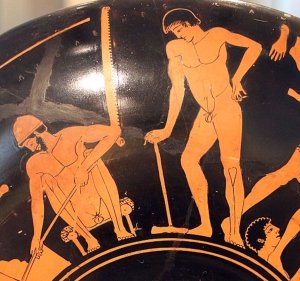Presented By: Classical Studies
Making and Recognizing Slave Bodies in Classical Athens
Deborah Kamen, Professor of Classics

Gerald F. Else Lecture
In his defense of slavery, Aristotle claims that nature makes the bodies of free men and slaves different. But he also recognizes that this is “often” not the case, and that some slaves are endowed with the bodies of free people (and vice versa) (Politics 1254b27-34). In this talk, I suggest that in classical Athens, too, an attempt was made to naturalize the distinction between slaves and free people (and especially citizens), but by different means: namely, through the differential treatment of enslaved people, including bans from the gymnasium, whipping and other corporal punishment, fetters and chains, tattooing and branding, manual labor, etc. In this way, legible “slave bodies” were made, thus justifying, albeit retroactively, their bearers’ enslavement. However, just as Aristotle’s argument breaks down, so too in Athens does the hard-and-fast distinction between slave and citizen bodies crumble when held up to scrutiny.
Deborah Kamen is Professor of Classics at the University of Washington. Her work focuses primarily on the social and cultural history of Ancient Greece, with particular attention to slavery. Her first book, Status in Classical Athens (2013), was described as "indispensable reading for anyone interested in ancient Athenian society" and an "important contribution to scholarship." She has also written a book on Insults in Classical Athens (2020) and co-edited the volume Slavery and Sexuality in Classical Antiquity (2021). Slavery is attested throughout ancient Greek history and all over the Greek world. Her most recent book, Greek Slavery (2023), offers a state-of-the-art guide to research on ancient Greek slavery, surveying recent scholarly trends and controversies and suggesting future directions for research.
In his defense of slavery, Aristotle claims that nature makes the bodies of free men and slaves different. But he also recognizes that this is “often” not the case, and that some slaves are endowed with the bodies of free people (and vice versa) (Politics 1254b27-34). In this talk, I suggest that in classical Athens, too, an attempt was made to naturalize the distinction between slaves and free people (and especially citizens), but by different means: namely, through the differential treatment of enslaved people, including bans from the gymnasium, whipping and other corporal punishment, fetters and chains, tattooing and branding, manual labor, etc. In this way, legible “slave bodies” were made, thus justifying, albeit retroactively, their bearers’ enslavement. However, just as Aristotle’s argument breaks down, so too in Athens does the hard-and-fast distinction between slave and citizen bodies crumble when held up to scrutiny.
Deborah Kamen is Professor of Classics at the University of Washington. Her work focuses primarily on the social and cultural history of Ancient Greece, with particular attention to slavery. Her first book, Status in Classical Athens (2013), was described as "indispensable reading for anyone interested in ancient Athenian society" and an "important contribution to scholarship." She has also written a book on Insults in Classical Athens (2020) and co-edited the volume Slavery and Sexuality in Classical Antiquity (2021). Slavery is attested throughout ancient Greek history and all over the Greek world. Her most recent book, Greek Slavery (2023), offers a state-of-the-art guide to research on ancient Greek slavery, surveying recent scholarly trends and controversies and suggesting future directions for research.